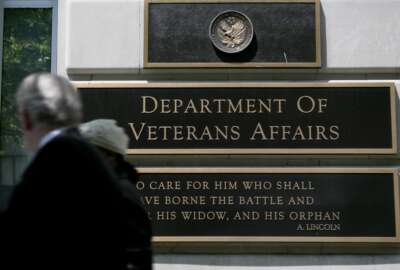VA whistleblower office no longer ‘agency in crisis.’ But lawmakers question its results
Members of the House VA Committee are concerned VA's Office of Accountability and Whistleblower Protection doesn’t have independence from the rest of the...
A Department of Veterans Affairs office that investigates whistleblower retaliation cases says VA leadership is acting on more of its recommendations for disciplinary action.
Members of the House VA Committee, however, are concerned VA’s Office of Accountability and Whistleblower Protection (OAWP) doesn’t have independence from the rest of the department to carry out its work, and that whistleblowers don’t trust the office to handle their retaliation claims.
Lawmakers and watchdogs also question the need for OAWP to investigate cases of alleged whistleblower retaliation, especially when VA employees can take their complaints elsewhere and often see better results.
Bruce Gipe, acting assistant secretary of VA’s Office of Accountability and Whistleblower Protection, told members of the oversight and investigations subcommittee that VA management is moving forward with more of its disciplinary recommendations.
In fiscal 2021, VA management implemented 68% of OAWP’s recommendations for disciplinary action. But in FY 2023, the department implemented 92% of OAWP’s recommendations.
“I think our numbers show that there is a little bit more confidence in us, because I think we’ve been doing good work. So, I think we continue to get more cases, and I think that’s a good thing,” Gipe said.
OAWP is also conducting whistleblower retaliation investigations more quickly. In FY 2021, the office took 251 days on average to conduct its investigations. But in FY 2023, OAWP took 82 days on average to investigate cases.
Lawmakers, however, remain skeptical of OAWP’s ability to investigate whistleblower retaliation cases. They see the office as duplicative, since VA employees can already file whistleblower retaliation complaints with the Office of Special Counsel, which investigates whistleblower retaliation cases governmentwide, and often with better results.
Subcommittee Chairwoman Jen Kiggans (R-Va.) said OSC in 2022 negotiated favorable actions with agencies in 12.5% of its prohibitive personnel practice cases. By contrast, OAWP only recommended discipline in 3.4% of its cases.
“I know that OSC and OAWP have somewhat different missions, and I know that OSC has had decades to work out the kinks, but I’m still left wondering if OAWP’s juice is worth the squeeze,” Kiggans said.
Emilee Collier, the chief of OSC’s Investigation and Prosecution Division, told lawmakers that OSC decides whether an investigation is required within 45 days in virtually every case.
If an employee’s allegations warrant further inquiry, OSC will refer the case to the head of the agency. The agency, at that point, must conduct an investigation and provide a report to OSC.
Collier said that in the past two fiscal years, OSC has seen record numbers of favorable actions on behalf of federal employees.
“This combination of enforcement authorities and successful resolution sends a strong message that OSC will conduct independent, objective inquiries in an effort to bolster whistleblower protections and the merit system as a whole,” Collier said.
Thomas Costa, director of the Government Accountability Office’s education, workforce and income security team, said about a third of OSC’s annual caseload comes from the VA.
Costa said “that’s not terribly surprising that it would be a significant portion” of OSC’s workload, considering the VA is the second largest federal agency.
OAWP and OSC collectively address about 1,225 whistleblower retaliation cases each year.
“There certainly is a duplicative nature to these two agencies. We have not looked into whether or not that duplication is warranted or not. It gives VA personnel multiple options to pursue their cases,” Costa said.
Thursday’s hearing on reforming OAWP and strengthening its independence echoes similar hearings held last year, in 2021 and 2019.
In 2019, the subcommittee heard testimony from three employees who suffered retaliation after making whistleblower disclosures. and resulted in the loss of their positions at VA.
Previous OAWP leaders told the subcommittee that they’ve made progress since 2019, when the VA inspector general said the office failed to protect whistleblowers and often misinterpreted its statutory mission.
Gipe said that when VA OIG released its report in 2019, OAWP was an “agency in crisis, and that crisis is no longer the case.”
He added that OAWP has implemented the IG’s recommendations and “greatly improved the quality of our investigations and our recommendations for discipline.”
Gipe said OAWP recently conducted its first-ever “climate review,” which examines the extent to which VA facilities and offices are fostering an environment where whistleblowers feel safe addressing their concerns.
“The information gathered will allow VA management to proactively address issues and create an environment that is safe for whistleblowers,” he said.
Gipe said OAWP had a “rough start” getting up and running under the 2017 VA Accountability and Whistleblower Protection Act, but added that the office benefits rank-and-file VA employees.
Beyond its role in investigating whistleblower retaliation, OAWP also addresses allegations of senior leader misconduct and poor performance.
“I think we add a lot of value,” Gipe said.
Tristan Leavitt, a former member of the Merit Systems Protection Board, now president of the nonprofit Empower Oversight, suggested that OAWP and OSC can serve complementary roles to protect whistleblowers.
“In my opinion, OAWP would likely be best situated to contributing to such a culture if investigating whistleblower retaliation was left to the experienced Office of Special Counsel and OAWP focused on the big picture of addressing trends at the VA,” Leavitt said.
The House last year passed a bill that would have stripped OAWP of its authority to investigate whistleblower retaliation complaints. The bill, however, never received a full vote in the Senate.
Rep. Chris Pappas (D-N.H.), who introduced the bill, said there have been “major shortcomings” in the rollout of OAWP.
Those shortcomings include cases where VA’s Office of General Counsel does not comply with OAWP’s recommendations for discipline and takes months or years to respond to settlement offers made by whistleblowers.
Pappas said lawmakers are also concerned about OAWP’s independence from VA’s Office of General Counsel.
“It’s critical to note that since OGC is tasked with protecting the department, it has an inherent conflict of interest, I believe with whistleblower cases when it’s advising OAWP,” Pappas said.
Gipe said OAWP stood up an Investigative Attorney Division last year that’s independent from the VA’s Office of General Counsel.
“Our attorneys help us identify issues properly scope investigations and provide legal sufficiency review for our reports of investigation, he added.
Gipe said VA’s Office of General Counsel does “not review our investigation or our recommendations for discipline.”
Copyright © 2025 Federal News Network. All rights reserved. This website is not intended for users located within the European Economic Area.
Jory Heckman is a reporter at Federal News Network covering U.S. Postal Service, IRS, big data and technology issues.
Follow @jheckmanWFED






